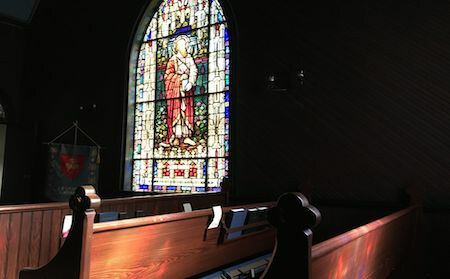Getting Ready for Sunday

Sing to the Lord a new song. ––Psalm 96:1
Today the whole earth sings and shouts for joy because the Lord is come. Heaven and nature sing, because “the grace of God has appeared” (Titus 2:11) in the birth of Jesus. We rejoice, because, “when the goodness and loving kindness of God our Savior appeared, he saved us” (Titus 3:4–5). In Jesus, the grace and goodness and love of God flames out, like light shining in darkness. When the light of Christ falls on us, it both reveals the devices and desires of our death-bound hearts and also shows us the way to life. So, today, we—who once walked in darkness but have now seen this great light—are filled with joy. “For unto us a child is born” (Isaiah 9:6), even “our great God and Savior Jesus Christ,” the same one “who gave himself for us” (Titus 2:13–14).
“Our great God and Savior Jesus Christ, who gave himself for us.” These words from the Letter to Titus are very fitting for Christmas Day. They come from one of the readings appointed for today: Titus 2:11–14. This passage is not as well-known as the story of the Nativity in Luke’s Gospel, but it expresses the whole meaning of that story, like a nutshell in which the whole Gospel is written in tiny script.
Jesus is the one “who gave himself for us” (Titus 2:14). In the man Jesus, the God of Israel gives himself for us. Our Creator gives himself for us in Jesus. The Word became flesh. Stop and wonder for a moment before this magnum mysterium, this great mystery.
“Who gave himself for us.” Titus expresses the mystery of the Incarnation in language picked up by Bernard of Clairvaux in a lovely passage:
‘What shall I render to the Lord for all that he has given me?’ In his first work he gave me myself; in his second work he gave me himself; when he gave me himself, he gave me back myself. Given, and regiven, I owe myself twice over. What can I give to God in return for himself? Even if could give him myself a thousand times, what am I to God? (On Loving God 5.15)
In giving himself to us in Jesus, the Lord gives us new life. The Lord gives us life in creating us, and gives us new life in the work of new creation in Christ Jesus, “who gave himself for us” (Titus 2:14). The Lord gives us ourselves, and when we had squandered ourselves, gives us back ourselves. Consequently, as St Bernard puts it, “Given, and regiven, I owe myself twice over.” Not only does our very life come as a gift from God, but the restoration of our life also comes as God’s gift. We have been given and regiven. We owe ourselves twice over.
What more can we do than to give ourselves to the One who gave himself for us? What can we do better than to praise our God and Savior? “Sing to the Lord a new song; sing to the Lord, all the whole earth. Sing to the Lord and bless his Name; proclaim the good news of his salvation from day to day” (Psalm 96:1–2).


